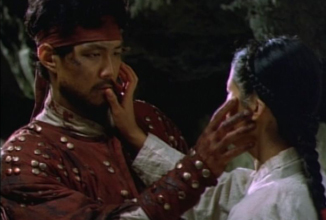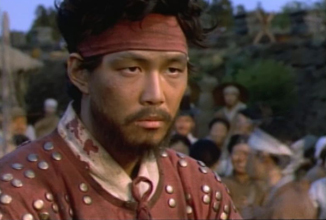Synopsis:
In the late 1800’s, during the Choson Dynasty, the newer Christian religious movement was gradually gaining strength and numbers, quickly becoming a force to be reckoned with and increasingly taking power from traditional Confusionists. The declaration by the Choson government, in 1901, of heavier taxation than had ever been seen in Korea (which was strongly supported by French Catholic priests in the country) caused the heated feelings of the Confusionists to explode, resulting in a rebel Confusionist army being formed which subsequently laid siege to the Christian stronghold in Cheju and resulted in the massacre of hundreds of Christians in little more than a matter of days. The Uprising details the events leading up to the assault, focusing on the story of Yi Jae-su, the young man destined to become the leader of the rebel army…
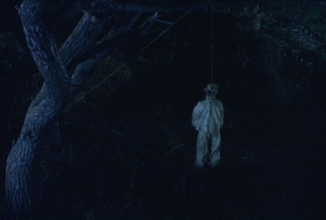 |
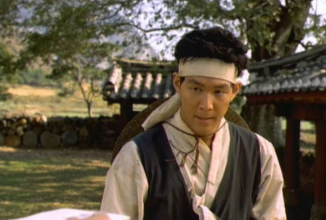 |
Review:
For a film to succeed, either on an individual level or in terms of (likely) box office takings, it needs to engage its audience through character empathy; narrative arc; out-and-out spectacle; or, ideally, a combination of some, or all, of the above, and every cinematic work must also strive to find a balance between individual character arcs and the overall story narrative. Admittedly these are often part and parcel of the same thing, but even for less character based storylines, that balance is vital. Tell a tale based on a factual historical event (or series of) and unless character empathy can be elicited, viewers might as well be watching an early evening documentary on the History channel.
Sadly, The Uprising fails spectacularly on every count (and that really is the only use of the word that the entire film warrants), faltering and subsequently falling at each and every single one of the above hurdles.
From the earliest stages of the film, exposition abounds, and though a certain amount of explanation of back-story is entirely understandable, and is, in fact, necessary for those unfamiliar with the history of the events about to unfold, here it is both endless and depicted in an overly obvious and altogether stilted manner. I actually lost count of the number of scenes which consist of nothing more than various (often nameless) characters conversing in lengthy, virtual monologues utterly choc-full of rambling exposition at the expense of any naturally sounding, believable dialogue.
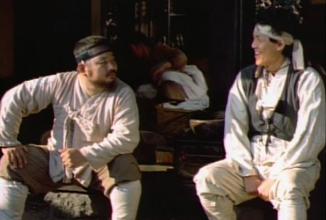 |
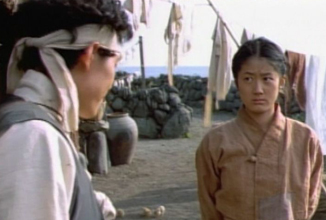 |
One of the beauties of South Korean Cinema is its regular ability to detail a story through its characters without the need for fake soap-box diatribes, and giving its audience the respect of being treated as having at least a modicum of intelligence (large Western studios' increasing refusal to do so, and their seeming assumption that an audience consists largely of morons who must be treated as such, as well as their incessant desire to explain everything occurring on screen, at length, in character dialogue, being a large part of what has caused me to repeatedly run screaming from Hollywood fare), but director Park Kwang-su knocks that idea firmly on its proverbial butt at every available turn throughout The Uprising. And in case you're under the mistaken hope that things might settle down, and the exposition fade, as the story progresses, it doesn't, plainly and simply, and when it's still going on after more than an hour you'll come to the realisation that that's pretty much going to be the state of play for the entire duration of the running time.
Just after an hour and a quarter through The Uprising, there is a scene featuring a single character on horseback, and though I breathed a short-lived sigh of relief that, finally, no long winded explanations were likely to be able to take place, Park Kwang-su dashed my hopes once more by simply switching to overdubbed character narration to further indulge his exposition obsession. It's not even as if the historical facts behind The Uprising are that involved or difficult to comprehend and, as such, endless explanations are quite simply patronizing and, from a cinematic point of view, rather lazy.
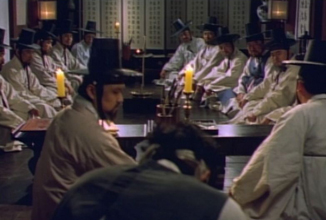 |
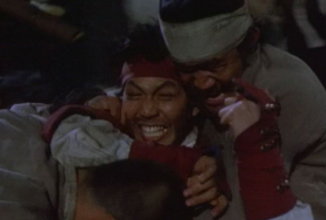 |
The knock-on effect of all of the above is that very little can be done, cinematography-wise, for many of the scenes and what we're left with are largely static camera shots of characters in full lecture mode. These routinely slowly pan to show Jae-su (Lee Jung-jae) full frame, but since most of the time he's simply staring (or looking down, thoughts apparently filling his head), we repeatedly, and increasingly, itch for something major to actually happen. It never does, and even the battle/fight scenes more often than not focus on our hero and his compatriots before, or after, the fighting takes place - the battles themselves seldom occurring on screen, and the rare times they do, they largely consist of not much more than groups of people, from one side or the other, running back and forth at varying distances with little more than the sound of rifle fire to prove that a battle is even taking place.
Not only that, but there are several instances of utterly unnecessary, and almost laughable, obvious dialogue within these scenes that only serve to stretch credibility yet further, disengage viewers to an ever greater degree, and likely make their eyes roll. Case in point: As a large number of Confusionist civilians run away from the Catholics, several pass the camera's field of view repeatedly shouting "It's the Catholics... Run away, it's the Catholics..." - everybody already knows it's the Catholics, that's why they're all running away, after all; and when Jae-su takes a rifle from a dead Catholic, he runs back to where the rest of the Confusionist army is situated, while a voice can be heard yelling "Jae-su's got a rifle... Jae-su's got a rifle... Jae-su's got a rifle." Sorry, but it’s pretty obvious that Jae-su has a rifle - it’s right in front of our eyes.
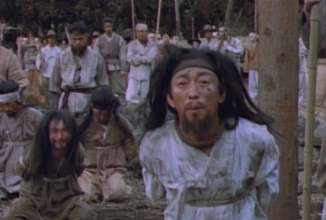 |
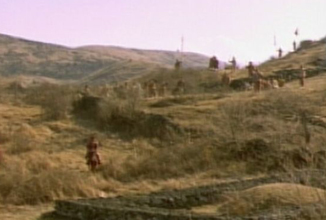 |
The only thing that could possibly have saved The Uprising is the sub-plot romance between Jae-su and the love of his life, Sook-hwa (Shim Eun-ha), but this aspect too is utterly squandered and so trodden down (and interrupted) by the film's pre-occupation with repeatedly stating historical facts that it's never shown to an extent that's even close to worthy of its supposed importance. Ok, so the real-life relationship between Jae-su and Sook-hwa would have been interrupted by events taking place around them too, but the fact that the closest we ever see them get in The Uprising (in the three short scenes in which they appear together) is Jae-su touching Sook-hwa's tear strewn face while she touches his (covered, as it is, in blood from the battle) and giving him a brief kiss. Resultantly, their interactions never achieve the significance they so obviously should and, frankly, elicit next to no viewer empathy whatsoever.
Normally in reviews, I have a separate 'Cast' section, but in the case of The Uprising, there's really no point. There is next to no depth given to any of the characters and the film as a whole is a total waste of not only the popularity of Shim Eun-ha, but also of the acting talent of both her and Lee Jung-jae, as well as the rest of the cast.
Summary:
A seemingly endless pre-occupation with forced exposition combined with a total lack of character depth and, resultantly, next to no possible character empathy whatsoever, all adds up to The Uprising being interminably dull from start to finish. Not only a waste of the talents of Shim Eun-ha and Lee Jung-jae but, ultimately, also rather a waste of viewers' time. An utter shame, especially considering how truly vital a film based on this story so easily could, and should, have been.
Cast:
Lee Jun-jae, Shim Eun-ha, Myung Kye-nam
Director: Park Kwang-su
DVD:
The DVD used for this review is the Hong Kong, Region 3, single disc release from Universe Laser and Video which is presented with an aspect ratio of 1.33:1. Unfortunately, the picture is, at best, lack-lustre and, at worst, close to unacceptable. Image artifacts abound and there is no sharpness or visual clarity present whatsoever.
The sound is provided as Dolby Digital 2.0, and is while it is clean enough, it too lacks any spark or sparkle.
Excellent subtitles are provided
throughout the main feature.
DVD Details:
Actors: Kim Kyu-chul, Kim Myung-gon, Oh Jung-hae
Directors: Park Kwang-su
Format: Colour, NTSC, Subtitled, 4:3 Aspect Ratio
Audio: Dolby Digital 2.0
Subtitles: Chinese, English, None
Region: Region 3
Number of discs: 1
Classification: 12
Studio: Universe Laser and Video
Run Time: 101 mins (approx.)
DVD Extras:
Star Files (Text)
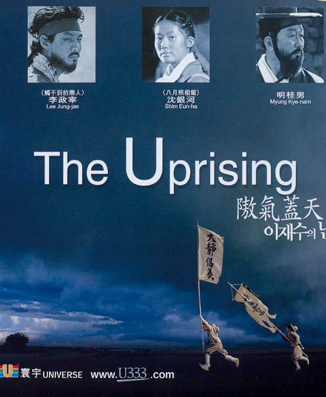 |
|










